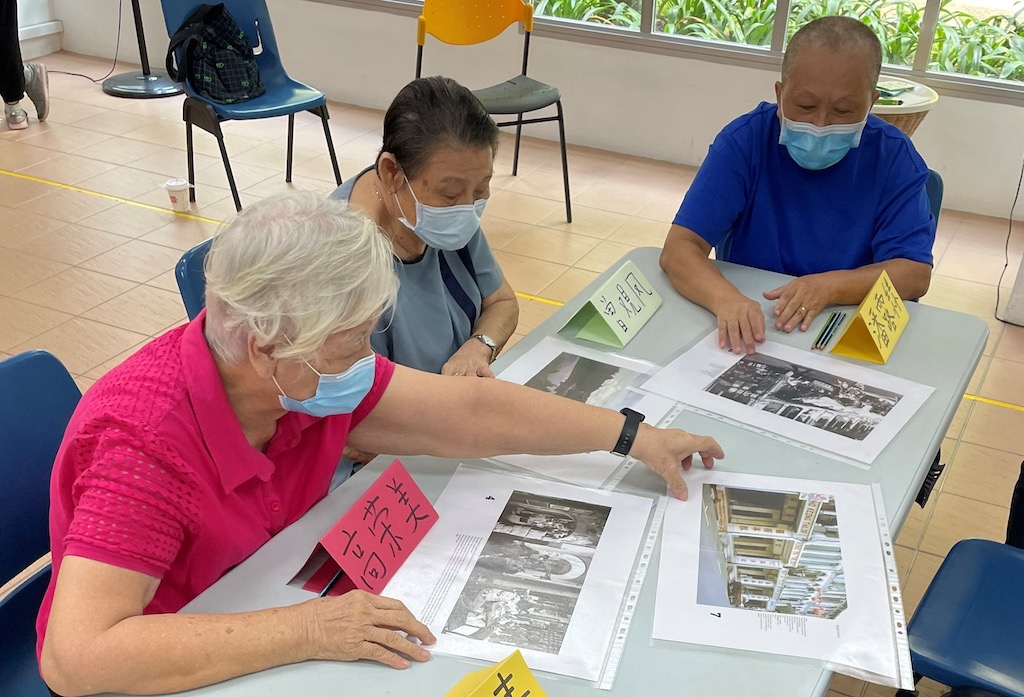Telling your stories
Seniors from Anglican Senior Centres took part in reminiscence and got to share their stories in Mandarin to a live audience.

Last year, the Singapore Chinese Cultural Centre (SCCC) presented a senior engagement programme titled “Telling Your Stories, Sharing Your Memories”. Part of the SilverArts’ programme organised by the National Arts Council (NAC), the programme led participants from the Anglican Senior Centres (ASC) through a process of reminiscence using exhibits from the SINGAPO⼈ exhibition at SCCC and folktales from the oral tradition. This culminated in the seniors sharing their stories in Mandarin to a live audience consisting of the seniors’ friends and the public who signed up. The programme was guided by storyteller and educator Wong Swee Yean, who has conducted a number of workshops and initiatives with NAC.
In the telling your stories programme, there were 12 two-hour sessions conducted weekly from November to December to 55 seniors at the ASC at Tampines, Yishun and Havelock. Those who attended range in age from 57 to 85. In one of the sessions, the seniors went on a tour of SCCC and saw the exhibitions. This gave the seniors the opportunity to talk about life in the past, about values, festivals, our unique Singapore language as well as foods that they remembered growing up with. After that tour, they were guided weekly to record their stories inspired by the exhibition. Not only that, the seniors gradually honed the skill of listening to one another, to craft their personal stories in a coherent way and to use their voice to speak expressively with confidence to an audience. Each session had theatre games to engage the body and mind as well as to build bonds with each other.
Swee Yean shared, “Older people typically lose short-term memory as they age, but are often still able to recall older memories. Most older people feel valued, contented and peaceful by recalling happy times from their past, thus reducing depressed feelings and promote good physical and mental health. Also, by learning to tell and listen to personal stories, they are improving communication skills. When people appreciate the stories shared by the seniors, their self-esteem improves.
“The famous German-American psychologist Eric Erikson said that reminiscence is a form of life review in relation to his eighth and final stage of psychosocial development, ego integrity versus despair. He proposed that in order to achieve ego integrity, older people needed to review their experiences to create a coherent sense of self. This is so true as I guided the seniors to recall their past. Sometimes, there were a few who did not want to talk about unpleasant past events and these ones were not forced to do so. A safe and respectful environment was created to give each the chance to share what they were comfortable to tell. Even unpleasant past experiences carry lessons that are worth learning. I think the seniors learnt this as they shared with one another.”
Asked on why the workshops were conducted in Mandarin rather than English, she explained that there were more Chinese-speaking seniors than English-speaking ones. That meant Swee Yean had to pivot the workshops towards Mandarin and got a chance to sharpen her own language skills. However, some seniors also had to pivot.
In each centre, there were about two seniors who were more confident in English than Mandarin. At the beginning of the workshops, they were not able to speak well. However, they were willing to learn, said Swee Yean. “The desire to communicate and also the willingness of the rest of the classmates to embrace them for their lack helped a lot. In fact, they started to learn the Chinese folktales, to converse fluently with their counterparts. The best part was the game of Chinese idioms. They learnt as they played. They told me that they learnt more about their Chinese heritage through being there. I didn’t have any dropouts due to fear of speaking on-stage.”
Swee Yean shared that she saw transformation or changes in the seniors besides their fluency with Mandarin. “Many of them became so confident in the 12th session that they began to let go of their script and to engage the audience as they told their stories. They weren’t just telling their stories but communicating to the audience about their stories. In particular, there were two seniors who admitted in the first two sessions that they were in low mood but by the fifth session, they were happier, so happy that the others noticed their change. Not only were they happy, but they also began to volunteer to speak in front of the class.
“I think they felt safe in my class and that they could trust the trainers and classmates. I had established guidelines on how to be better listeners. I explained the need to listen with delightfulness whenever their friends share. I believe everyone felt that they were valued regardless of their social status, whether one was a cleaner or an accountant.”
She also noticed the kampung spirit and gotong royong of mutual assistance that appeared in the workshops in all three centres, with the more cognitive-abled seniors taking the initiative to help. “One husband-and-wife couple offered to type out the stories for the forgetful ones so they could read from the script. Another lady offered to help the older seniors by writing out keywords. Another group of seniors helped the ones with dementia to carry out an ‘interview’ style of presentation so no one would be left out at the final presentation.”
Swee Yean hopes that such stories by the seniors could be shared to the younger generation. “My 14-year old son came to help me in two sessions. He appreciated the stories told. I have hope that the personal stories of ordinary older people in our community can be shared in their authentic voice with today’s youth.”
(** PHOTO CREDIT: National Arts Council)

0 Comments